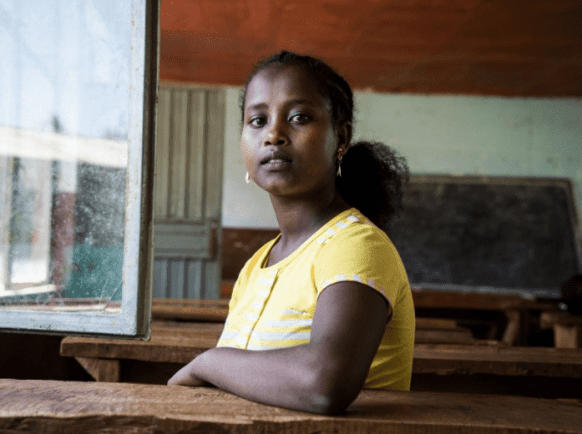
One brave group of girls is standing resilient against Female Genital Mutilation in an incredible way. Raised in a culture where the harmful procedure is common practice, these girls are now rebelling against the norm.
The World Health Organization describes Female Genital Mutilation, or FGM, as any procedure that injures the female genital organs for non-medical reasons. FGM has no health benefits and is very harmful to a woman's health in many ways.
The Uncut Girls' Club
So how do you stop a dangerous, awful practice that's so ingrained into a way of living?
Lentata, a 16-year-old Ethiopian, used to accept FGM as part of her culture and even looked forward to the procedure for herself. But after learning the reality of FGM, she completely changed her mind.
"When my friends and I decided to save ourselves from this monstrosity, we also decided we would help save other girls," Lentata said.
Lentata and her friends are finding new ways to fight FGM though a groundbreaking school club - the Uncut Girl's Club. More than 50 girls have banded together, and they lead the charge in educating their peers, being a voice for girls' rights in their community and convincing families to change their views.
Though many are celebrating the bravery of these girls, their efforts aren't free of resistance or hardship. Many still believe FGM is an important tradition.
"It is not always easy for us that everyone knows we are uncut," shared 14-year old Dorite. "Some people think that we are not clean." Nonetheless, Dorite said she is proud she's not cut.
The problem of FGM
In many societies, FGM is a common practice. In fact, At least 200 million girls and women alive today have undergone a form of FGM. Although these numbers are primarily concentrated in African and Middle East countries, FGM is a universal problem that continues to persist is Asia, Latin America, Western Europe, North America, Australia and New Zealand.
It sounds horrible, so why does it happen?
According to Plan International, "Cultural beliefs are a strong factor in why this harmful practice takes place. These include the idea that it preserves chastity, cleanliness, family honour and preserves a girl for marriage."
But there are no health benefits (or any benefits at all) that come from FGM. Rather, it's a violation of girls' rights and can cause severe bleeding, problems urinating, cysts and infections, not to mention lasting emotional trauma. as well as complications in childbirth and increased risk of newborn deaths.
In some cases, the practice results in death for women and newborns due to the childbirth complications caused by FGM.
The men who stand with the Girl's Club
Many men and boys support the Girl's Club. Kebebe, a 38-year-old dad and headmaster of the school where the Uncut Girl's Club originates, fully supports his students' efforts to put an end to FGM.
"The members of the club discuss FGM, early marriage and other harmful practices," Kebebe shared. "They spread the word in their own communities too. This has really made a difference.
Kebebe was once unaware of the harmful truth of FGM, but when he noticed a significant decline in his female students' attendance after their FGM procedure, he decided to look into the matter more.
His eyes opened to the dangerous reality of FGM, and now he and other teachers at the school are fighting to teach their students to resist the cultural practice. Kebebe says many boy students at his school have joined the effort.
Kebebe is defiant against his own daughter or any of his female students experiencing FGM.
"My 9-year-old daughter has not had FGM, and will not have it," Kebebe said.
A hopeful future
Through the efforts of the Uncut Girl's club and the support group of others, the group of rebels is making a critically needed step in the right direction to change this longstanding harmful practice.
They're making a huge change for girls' basic rights by spreading education and awareness - and they hope many people will join in with them to raise awareness through sharing.

